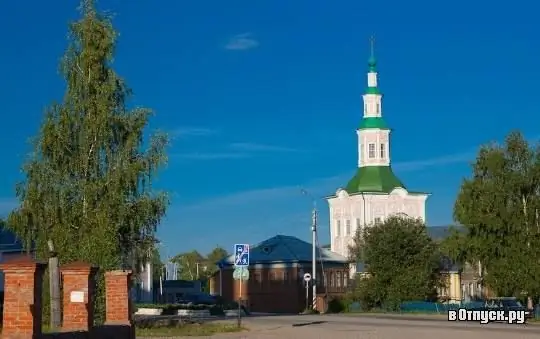
Description of the attraction
The Church in honor of the Nativity of Christ is located in the city of Totma, in the very center. The temple was built in two stages. At first, in 1746-1748, a warm church (lower) was erected in honor of the great bright Christian holiday of the Nativity of Christ. Later, in 1786-1793, a cold church (upper) was built and consecrated in the name of the great holy miracle worker Nicholas, Archbishop of Mirlikia. Separately from the temple, in 1790, a stone bell tower was erected. In the lower tier of the stone bell tower, a church with a throne in the name of the holy saint Paraskeva Pyatnitsa was built and consecrated.
The church was built in the style of the regional (totem) Russian baroque. Churches built in this style are usually tall, have a long narrow base, and appear narrower in profile than in front. Their stone walls are decorated with ornaments and angular domes. Such buildings were built only in Totma, although similar ones are found in other places.
The lower tier of the Nativity Church is elongated and includes the altar (pentahedral), the temple itself and the refectory. It is separated from the upper church by a cornice. The architectural composition is complex. The entire temple aspires upward, and it resembles a candle, it can also be compared to a warm heartfelt prayer that ascends to heaven.
Above the refectory, a quadrangle of the winter church was built up, which ends with a cornice with semicircles and a dome, above which an octagon rises, carrying two small octons stacked on top of each other. The walls of the temple are decorated with vertical thin pilasters (paired and single). Above the windows there are cartouches (stucco or graphic decoration in the form of a shield or a slightly unfolded scroll with a coat of arms, emblem or inscription). A stone refectory with a staircase and a porch is attached to the summer church. The richly decorated portal extending into perspective, made in the traditions of the 17th century, is located on the south side of the porch. The lower tier is similar to the basement of the temple, which stands out for its harmony, lightness, sophistication, integrity.
The Church in honor of the Nativity of Jesus Christ was closed in the sad 30s of the last century. The bell tower and the church in the name of St. Paraskeva Friday were destroyed. In 1988, in honor of the celebration of the 1000th anniversary of the Baptism of Russia by the Great Equal-to-the-Apostles Prince Vladimir, the greatest relic was transferred to the diocese, which was kept in the Vologda Museum of Local Lore. These are the relics of Saint Theodosius of Totem, which rested in a cypress coffin. First, they were transferred to the Vologda Lazorevskaya church (which is located at the Gorbachevsky cemetery). In 1994, with a triumph, the holy relics, at the request of the believers, were transferred to the church in honor of the Most Holy Trinity in the city of Totma. Saint Theodosius of Totma worked in Totma during his earthly life. He was born about 1530 in Vologda, died in 1568, on January 28. He was known and loved as a meek and humble abbot of the monastery, he founded a large library. Miracles are known that took place after the death of the monk. The imperishable holy relics were found during the rebuilding of the temple in 1796.
Only in 1995 the church was transferred to the Vologda diocese. The temple was re-consecrated in 1999. At present, in the lower church in honor of the great feast of the Nativity of Christ, the incorruptible relics of the founder of the Spaso-Sumorin monastery (in honor of the icon of the Most Holy Theotokos "Sumorinskaya"), the wonderworker, Saint Theodosius of Totem, rest. Divine services are regularly held in the temple.
The church is a monument of Totem church architecture of the 18th century and is of historical and cultural value.
Description added:
Vladislav Kalashnikov 2016-28-10
On September 15, 2016, during the All Grad procession of the cross, the relics of the Monk Theodosius of Totma were transferred from the Church of the Nativity of Christ to the monastery founded by the monk - the Spaso-Sumorin Monastery.






